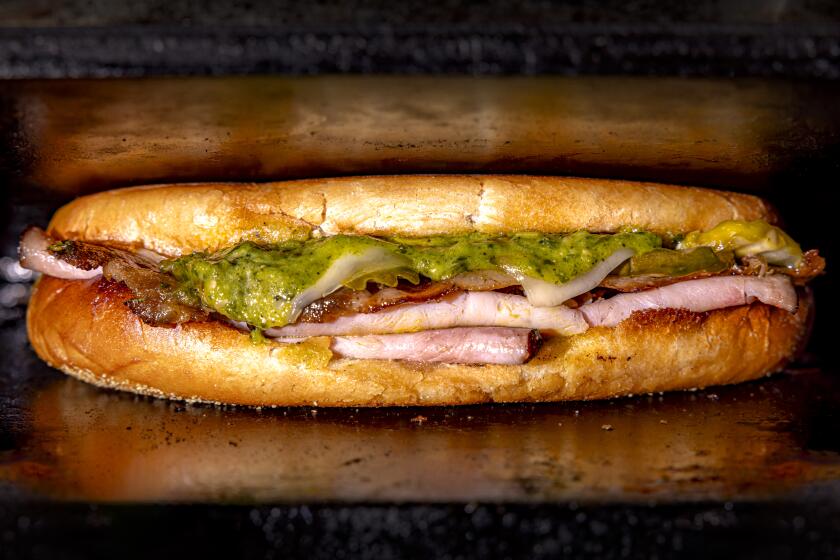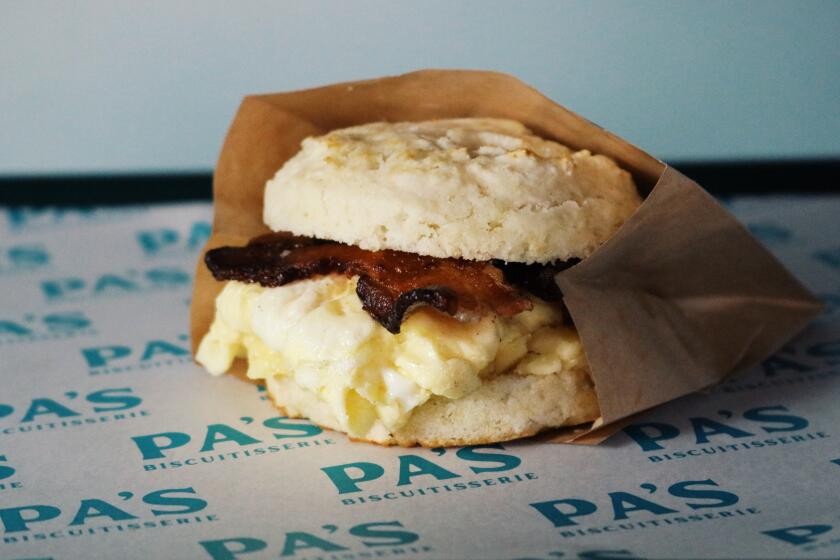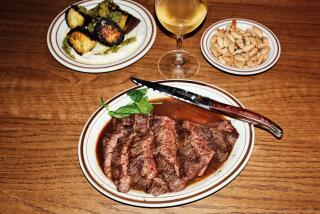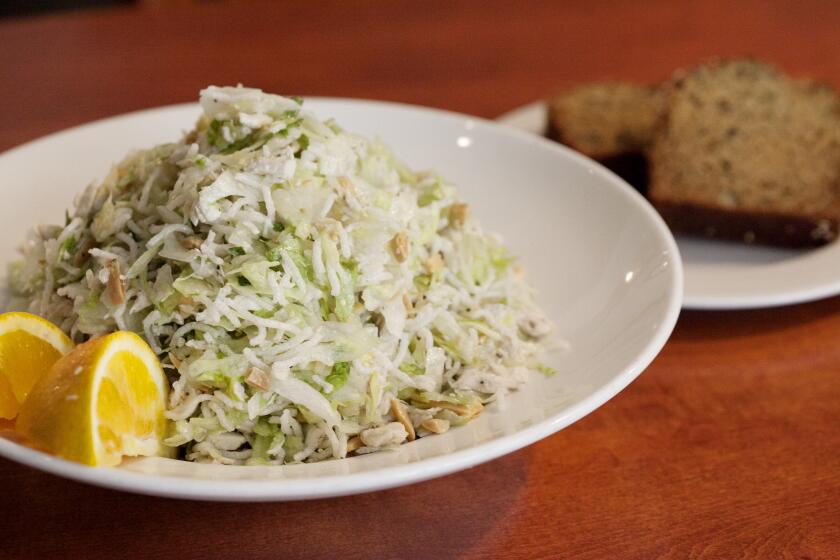Feeling royal? This is my new favorite Peking duck in L.A.
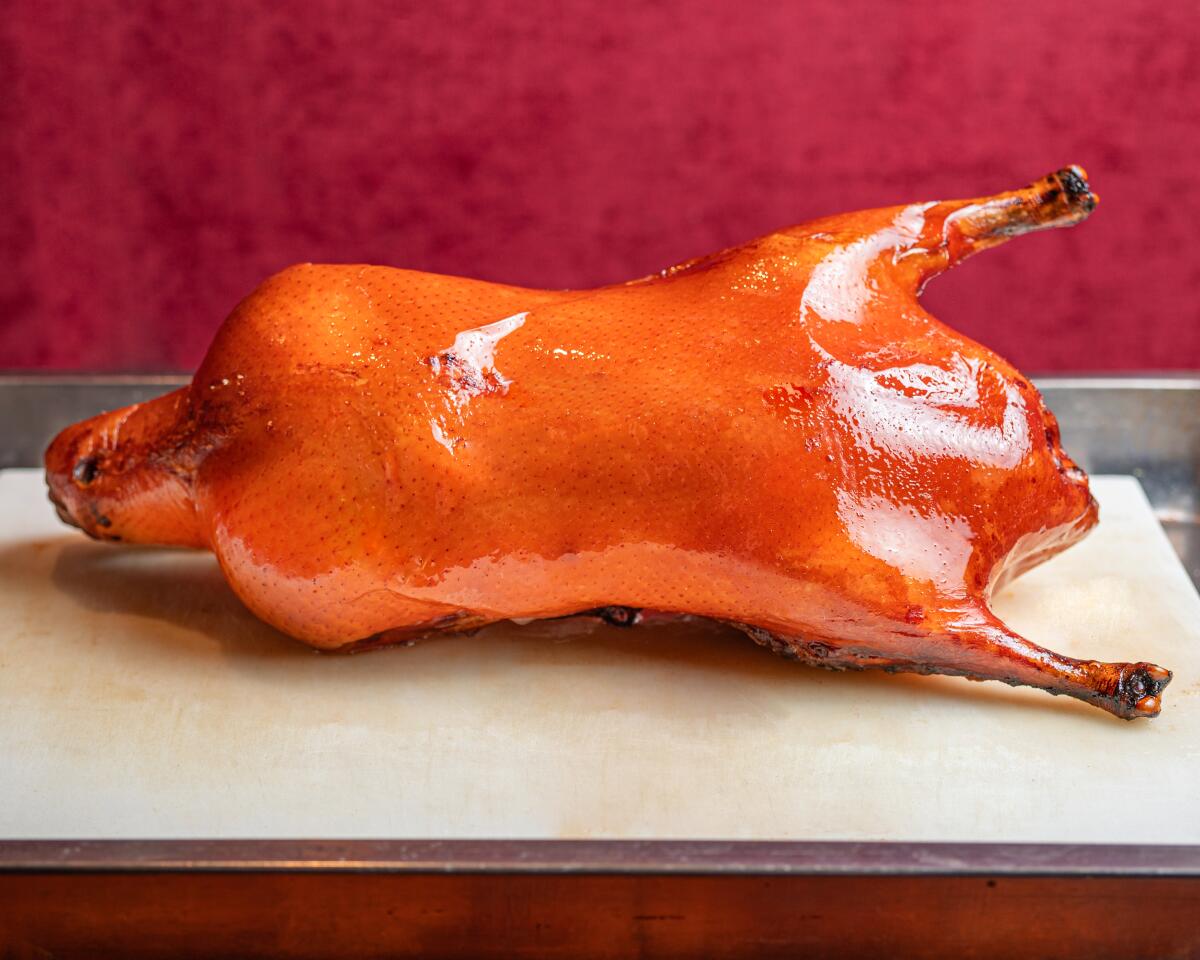
- Share via
People often ask me where to find the best Peking duck. It’s a question that comes up year-round, but more frequently during the holidays. And especially around now, with Lunar New Year celebrations on the horizon in February.
Strangers slide into my DMs wanting to know which restaurants prepare the duck, and if it comes with pancake wraps or bao. They inquire about the price, and whether you need to order ahead.
I’ve been made to feel like a personal concierge for Peking duck, and it’s a position I don’t take lightly. Roast duck is a dish that was favored by emperors, with the Qianlong Emperor of China rumored to have eaten roast duck eight times in two weeks during his reign in the 18th century. Peking duck even played a role in global politics, with Chinese Premier Chou En-lai serving the dish to Henry Kissinger in the 1970s.
The best celebrity restaurant in Vegas right now and what to eat at the new Fontainebleau and the Durango Casino and Resort.
Inspired by the many inquiring minds who reached out over the past few weeks, I set out to see if my usual favorite, Ji Rong Peking Duck on East Valley Boulevard, is still the best option. There, the duck is presented as a mound of roasted meat on a platter surrounded by tiles of crispy skin. The legs are separated on another plate, alongside ramekins of scallions, diced cucumber, sweet bean sauce and a steamer basket full of chun bing gossamer pancakes.
On my last visit, the meat was disappointingly on the drier side, and the skin not as crisp as I remember. Meizhou Dongpo in Arcadia still serves a first-rate Peking duck. But this week, a new favorite emerged.
Na’s Peking duck from Bistro Na’s
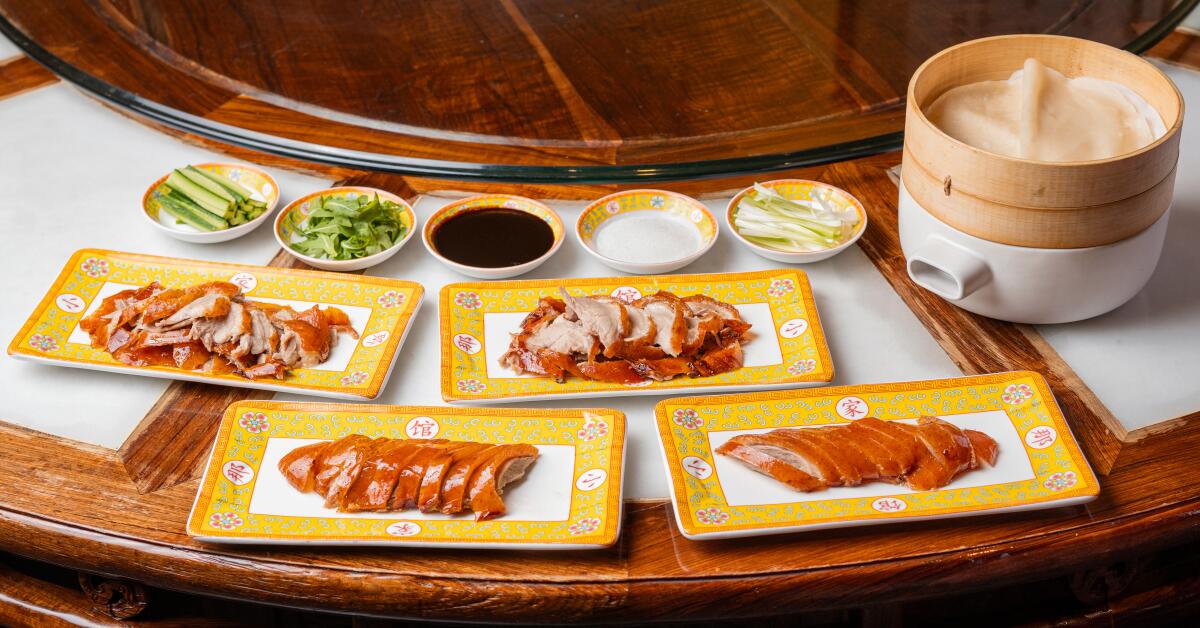
The Na’s Peking duck is presented whole to the table, its shiny skin the color of golden honey. It looks impossibly plump, like at any moment it may spontaneously burst open. After audible gasps from diners and many photos, it’s whisked away back into the kitchen to be sliced.
A few minutes later, a chef wearing a toque and a crisp white chef’s coat emerges with the sliced duck neatly arranged on multiple plates. He serves the duck with a dish of sugar, instructing you to dip the meat. The glossy skin has a sort of ethereal crispness to it, with a texture that shatters, then melts. The sugar seems to expand and temper the richness of the skin all at once, giving it the addictive qualities of your favorite bag of potato chips.
While you eat the meat dipped in sugar, the chef tends to a cart he’s slid up against the table. It’s crowded with a bamboo steamer basket full of chun bing and an ancient-looking wooden box that houses bowls of sliced scallions, cucumber, a sweet flour sauce and micro bulls blood in a deep shade of purple.
He proceeds to build each person at the table their first duck wrap, brushing a bit of the sauce onto a pancake, then layering on two pieces of meat. He adds cucumber, a few strands of scallions and some of the bulls blood. Then he wraps the pancake into a neat roll and presents it like a gift.
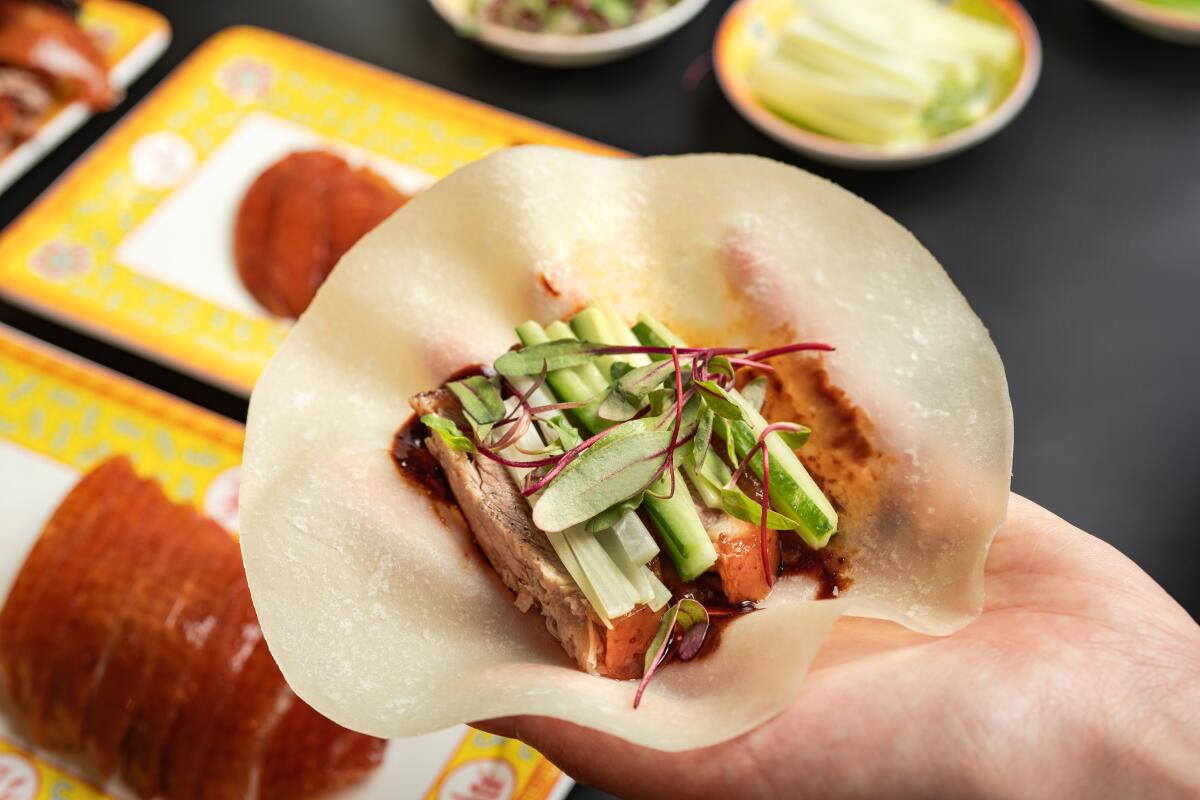
The pancake is thin enough to be translucent, satisfyingly chewy and mild in flavor. Bistro Na’s chef Tian Yong makes his own sauce for the duck, incorporating Huadiao rice wine, sesame oil and sugar. It’s sweet but not overpowering, and much subtler than the hoisin sauce used to accompany the duck at many other restaurants. The bulls blood, mild but nutty, will change with other greens based on the season.
“The Peking duck I make has the traditional taste of Peking duck from old Beijing, a delicacy that was once only available in the royal palace during the Qing Dynasty,” Yong said.
Yong estimates that he spent two years developing his preparation method, finally introducing the duck to the menu in late November. He started with just three ducks per day, gradually increasing the number to five, and now eight. To order the duck, you’ll need to make a table reservation and request the dish at least two days in advance.
“The limitation is necessary due to the complex preparation process and our limited space,” Yong said.
Is this a biscuit town? Here’s where to find flaky biscuits, drop biscuits and biscuit bakes in and around Los Angeles.
The repetitive, meticulous process takes three days to complete and involves marinating the duck, scalding the skin, and hanging and drying the duck multiple times before roasting.
The duck is served in three stages, first with the crispy skin and meat, then wrapped in the pancake and lastly in a soup or as deep-fried bones. When you order, you specify the third preparation. I prefer the soup, which acts as a calming respite between bites of lavish crispy skin. The gamey undertones of the duck are subtle but present in the milky broth, served in a small cup brimming with soup and wilted cabbage.
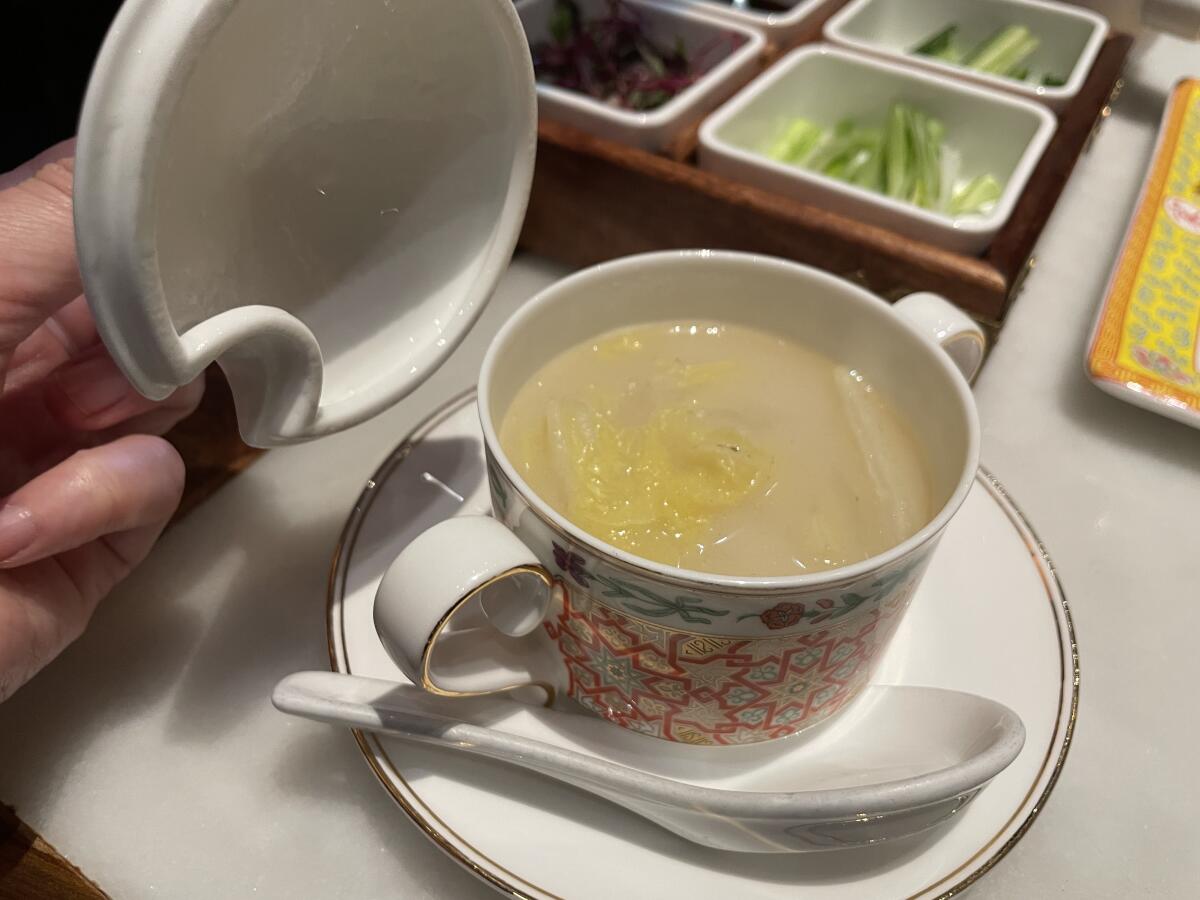
The whole duck, the pancakes and the condiments are $98. The soup and fried bones are available for an additional charge.
Having the chef build and hand over that first duck wrap is as close, I suspect, as I’ll ever come to feeling like royalty. It was a feeling that lasted through lunch but faded quickly in the driver’s seat of my Prius on the trip home.
Duck from Duck
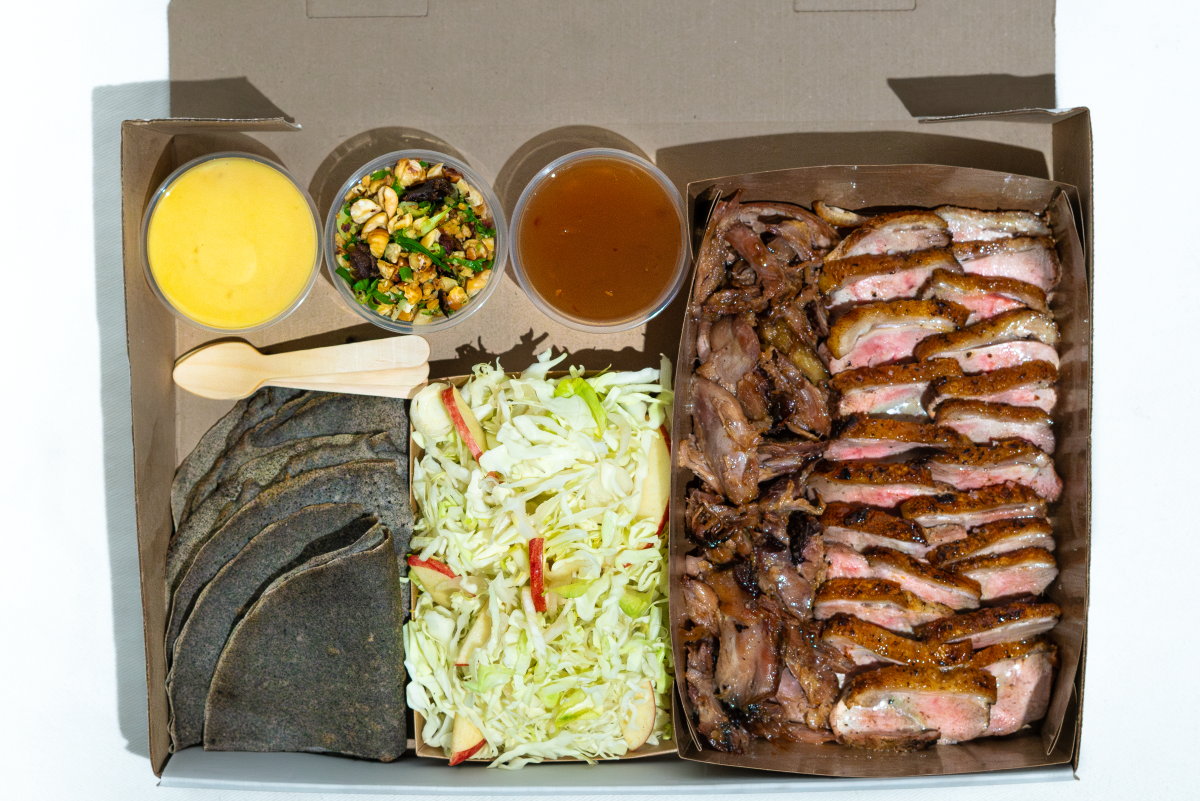
The duck from Duck, Eric Greenspan’s new virtual restaurant, isn’t a traditional Peking duck. But it is a duck just as grand and befitting a celebration. Greenspan’s duck is delivered in a box via Postmates, with various condiments meant to mimic the traditional Peking duck accoutrements.
After spending half a decade creating virtual restaurants such as Mr. Beast Burger and an entire virtual food court called Alt/Grub/Faction, the once high-end chef at Patina restaurant turned his attention to duck.
“Even when I was doing the ghost kitchen stuff, I was thinking about what the high-end delivery game might look like,” Greenspan said. “It needs to be something that people share and that is experiential. Duck!”
Heavily curated superettes are popping up in neighborhoods all over Los Angeles, offering artisanal pantry, grab-and-go and other small-batch items from local businesses.
Duck is a dish Greenspan frequently served on his tasting menus at Patina, and it was heavily featured at his later restaurant Foundry.
“It’s not Peking duck, but it is inspired by it,” he said. “I wanted to be clear that this is not a Chinese presentation but at the same time have little hints so that people knew I was paying homage to it.”
Greenspan exclusively uses ducks from Joe Jurgielewicz & Son, Ltd., a company that sources its birds from farms in Pennsylvania. He roasts the breasts until the fat in the skin starts to render and crisp up, then lacquers them in reduced apple cider vinegar, black pepper, rice wine vinegar and some of the gelatin that forms from the duck confit. The meat, cooked rare and cut into thin slabs, seems to be saturated in its own juices.
Greenspan cures his duck legs in an anise-heavy mixture of salt, pepper and anise seed and slowly cooks them in duck fat. Then he glazes the legs in a sauce made from garlic caramelized in brown sugar, rice wine vinegar and soy. The sweet glaze evokes that little dish of sugar served in a more traditional Peking duck presentation, heightening the flavors of the meat. He serves the leg meat off the bone like a pile of shredded duck candy.
As enjoyable as the duck is on its own, Greenspan’s condiments may be the most fun elements of the presentation. In place of the chun bing are thin buckwheat crepes enriched with duck fat and brown butter. They’re pliable and sturdy enough for a pile of duck, making them the ideal meat vessel.
Shaved Napa cabbage, Belgian endive and apple tossed in a rice wine vinegar dressing impart some welcome freshness and stand in for the traditional scallion and cucumber. There’s also a nose-tingling honey mustard and a plum sauce doctored up with roasted apples. And for a bit of crunch, there’s a cup of duck-ah, a playful take on the crunchy condiment dukkah. Greenspan’s version is fashioned with crispy fried duck skin, toasted hazelnuts, scallions and garlic.
Greenspan plans to offer the duck, priced at $85 for the set, once or twice a month through Postmates. Sometimes, he may make duck wings, fried and doused in lemon pepper and five-spice. He’s looking to collaborate with different chefs around town too.
“Once the imagination train leaves the station, it’s hard to put it back in,” he said.
The next Duck delivery is scheduled for Jan. 25. Availability and updates are posted on the Duck Instagram page.
Where to get Peking duck
Bistro Na’s, 9055 Las Tunas Drive, #105, Temple City, (626) 557-4179, bistronas.com
Duck, instagram.com/duckdelivery
Ji Rong Peking Duck, 8450 E. Valley Blvd., Rosemead, (626) 280-8600, jirongpekingduck.com
More to Read
Eat your way across L.A.
Get our weekly Tasting Notes newsletter for reviews, news and more.
You may occasionally receive promotional content from the Los Angeles Times.
